Serving 461 students in grades Kindergarten-5, Dunn Elementary School ranks in the top 20% of all schools in Kentucky for overall test scores (math proficiency is top 20%, and reading proficiency is top 20%).
The percentage of students achieving proficiency in math is 50% (which is higher than the Kentucky state average of 38%). The percentage of students achieving proficiency in reading/language arts is 57% (which is higher than the Kentucky state average of 45%).
The student:teacher ratio of 16:1 is higher than the Kentucky state level of 15:1.
Minority enrollment is 38% of the student body (majority Black), which is higher than the Kentucky state average of 28% (majority Black and Hispanic).
Quick Stats (2025)
- Grades: Kindergarten-5
- Enrollment: 461 students
- Student:Teacher Ratio: 16:1
- Minority Enrollment: 38%
- Overall Testing Rank: Top 20% in KY
- Math Proficiency: 50% (Top 20%)
- Reading Proficiency: 57% (Top 20%)
- Science Proficiency: 50-59% (Top 5%)
- Source: National Center for Education Statistics (NCES), KY Dept. of Education
Top Rankings
Dunn Elementary School ranks among the top 20% of public schools in Kentucky for:
Category
Attribute
Overall Rank
Math Proficiency
Reading/Language Arts Proficiency
Science Proficiency
School Overview
Dunn Elementary School's student population of 461 students has declined by 13% over five school years.
The teacher population of 28 teachers has stayed relatively flat over five school years.
Grades Offered
Grades Kindergarten-5
(offers virtual instruction)
(offers virtual instruction)
Total Students
461 students
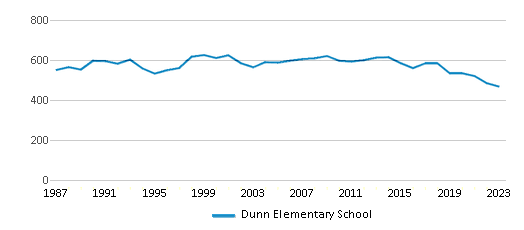
Gender %
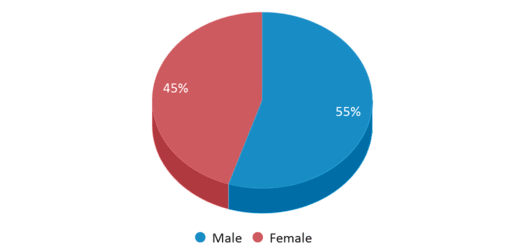
Total Classroom Teachers
28 teachers
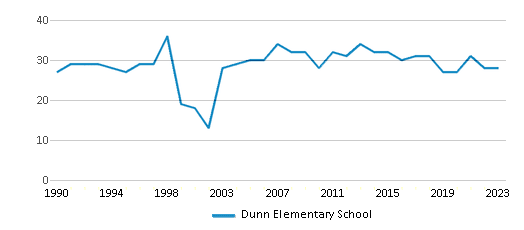
Students by Grade
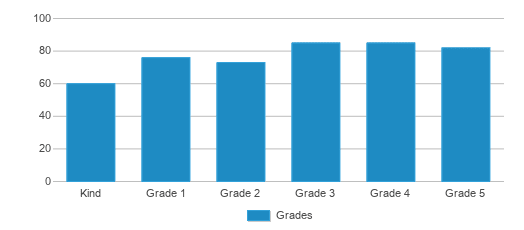
School Rankings
Dunn Elementary School ranks within the top 20% of all 1,267 schools in Kentucky (based off of combined math and reading proficiency testing data).
The diversity score of Dunn Elementary School is 0.58, which is more than the diversity score at state average of 0.46. The school's diversity has stayed relatively flat over five school years.
Overall Testing Rank
#189 out of 1267 schools
(Top 20%)
(Top 20%)
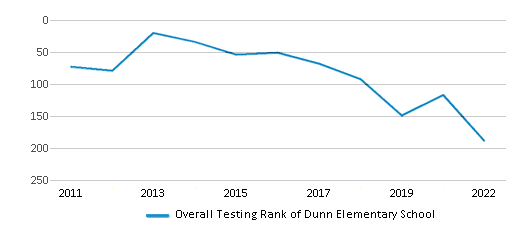
Math Test Scores (% Proficient)
50%
38%
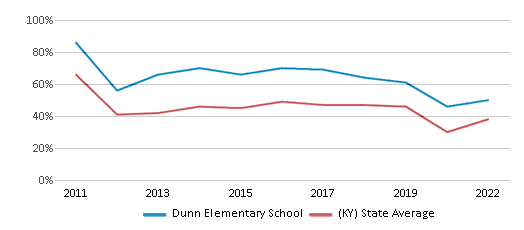
Reading/Language Arts Test Scores (% Proficient)
57%
45%
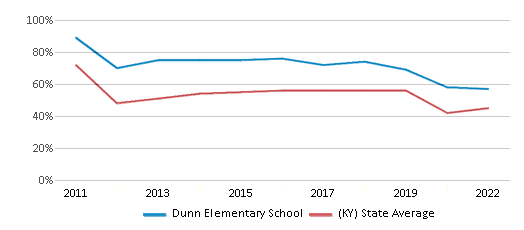
Science Test Scores (% Proficient)
50-59%
22%
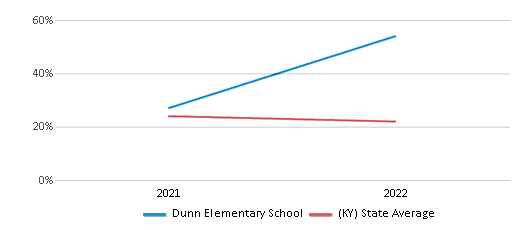
Student : Teacher Ratio
16:1
15:1
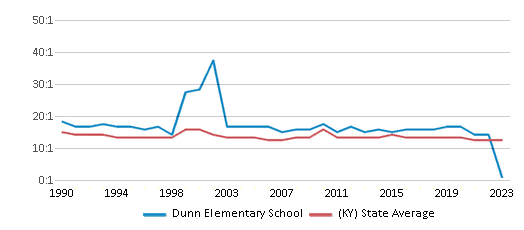
American Indian
n/a
n/a
Asian
7%
2%
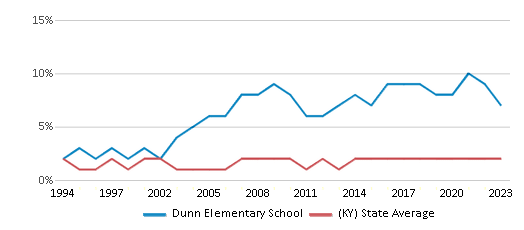
Hispanic
6%
10%
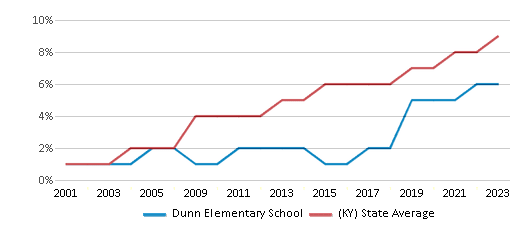
Black
18%
11%
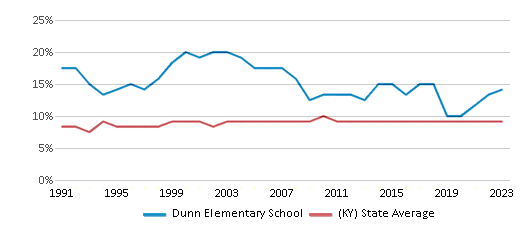
White
62%
72%
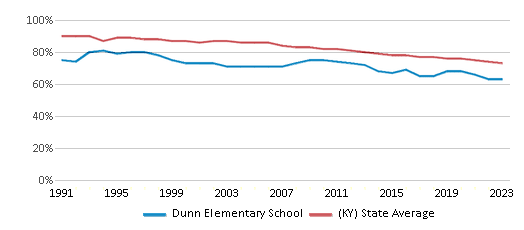
Hawaiian
n/a
n/a
Two or more races
7%
5%
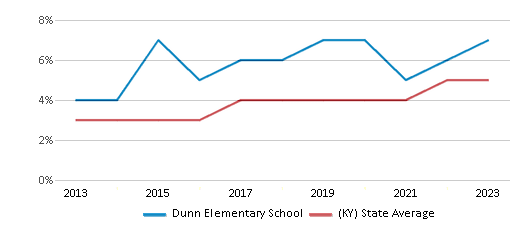
All Ethnic Groups
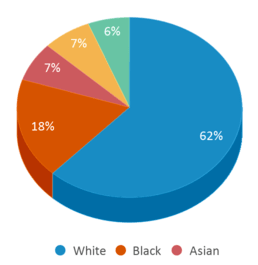
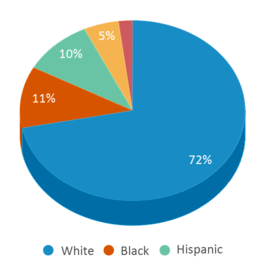
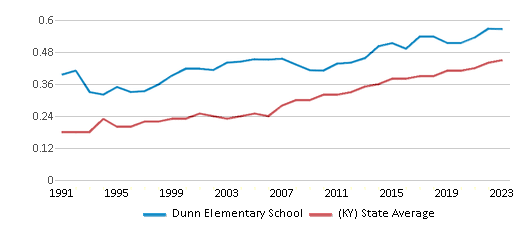
Eligible for Free Lunch
29%
56%
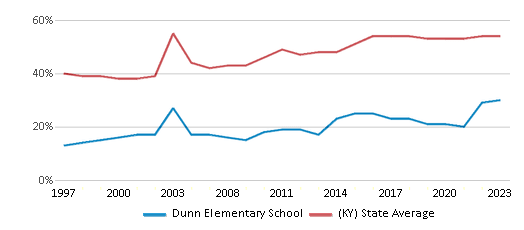
Eligible for Reduced Lunch
1%
3%
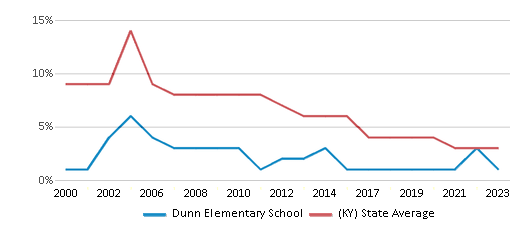
School Statewide Testing
School District Name
Source: National Center for Education Statistics (NCES), KY Dept. of Education
Profile last updated: 02/09/2025
Frequently Asked Questions
What is Dunn Elementary School's ranking?
Dunn Elementary School is ranked #189 out of 1,267 schools, which ranks it among the top 20% of public schools in Kentucky.
What schools are Dunn Elementary School often compared to?
Dunn Elementary Schoolis often viewed alongside schools like Wilder Elementary School by visitors of our site.
What percent of students have achieved state testing proficiency in math and reading?
50% of students have achieved math proficiency (compared to the 38% KY state average), while 57% of students have achieved reading proficiency (compared to the 45% KY state average).
How many students attend Dunn Elementary School?
461 students attend Dunn Elementary School.
What is the racial composition of the student body?
62% of Dunn Elementary School students are White, 18% of students are Black, 7% of students are Asian, 7% of students are Two or more races, and 6% of students are Hispanic.
What is the student:teacher ratio of Dunn Elementary School?
Dunn Elementary School has a student ration of 16:1, which is higher than the Kentucky state average of 15:1.
What grades does Dunn Elementary School offer ?
Dunn Elementary School offers enrollment in grades Kindergarten-5 (offers virtual instruction).
What school district is Dunn Elementary School part of?
Dunn Elementary School is part of Jefferson County School District.
School Reviews
5 2/14/2022
It's a great school. Our children have loved growing here and the teachers have fostered an environment where they can learn and grow.
2 5/3/2011
On the surface, the school is a model of program successes; however, once one digs a little deeper, cracks appear that are more indicative of a school in crisis rather than a model school of achievement. If one's child happens to fall into that upper tier of test takers or lower end of academic goal setting but excels at athletics, then all is well and the Bell Curve is satisfied; however, once a child falls outside this well-prescribed boundary, the child is lucky to receive the time of day let alone the tools necessary to overcome a serious learning disability like ADD/ADHD despite the school's knowledge of the diagnosis. In their words, they were waiting for him to fail before they became involved if the parents didn't specifically request a school intervention. Didn't notice that in that school mission. As a result of the school's purposeful foot-dragging, it took nearly 3 full school years before our child got the help he needed. And this is one of the best the school system has to offer? I shudder to think what the kids at the other end of the spectrum receive.
Review Dunn Elementary School. Reviews should be a few sentences in length. Please include any comments on:
- Quality of academic programs, teachers, and facilities
- Availability of music, art, sports and other extracurricular activities
Recent Articles

What Is A Charter School?
Explore the world of charter schools in this comprehensive guide. Learn about their history, how they operate, and the pros and cons of this educational innovation. Discover key facts about charter schools, including admission policies, demographics, and funding, as well as what to look for when considering a charter school for your child.

10 Reasons Why High School Sports Benefit Students
Discover the 10 compelling reasons why high school sports are beneficial for students. This comprehensive article explores how athletics enhance academic performance, foster personal growth, and develop crucial life skills. From improved fitness and time management to leadership development and community representation, learn why participating in high school sports can be a game-changer for students' overall success and well-being.

February 05, 2025
Understanding the U.S. Department of Education: Structure, Impact, and EvolutionWe explore how the Department of Education shapes American education, from its cabinet-level leadership to its impact on millions of students, written for general audiences seeking clarity on this vital institution.





